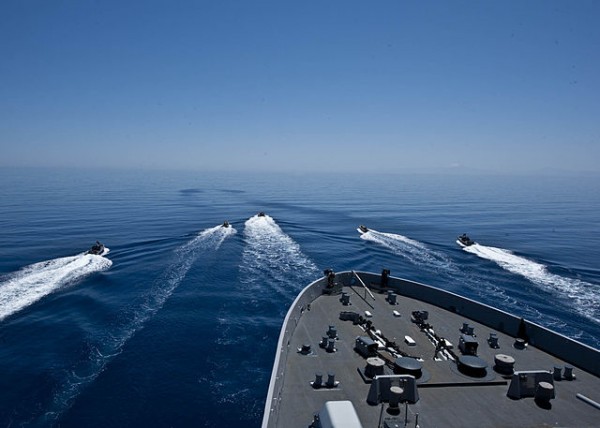
MC3 Ian Carver/U.S. Navy
Is the U.S. accidentally preparing for World War I again? In this two-part series, leading thinkers from a prior era of globalization instruct us on maritime and cyber security today.
In our constant consumption of the latest news, we risk overlooking history and missing context. Competing insights from a century ago inform debates today on Russian and Chinese naval strategies (this post) and cybersecurity (the next).
Alfred T. Mahan and Norman Angell were prominent thinkers of the late 19th and early 20th centuries. Mahan was a U.S. naval officer who literally wrote the book that shaped American naval strategy for decades. Angell warned of the futility of war for so long that ended up he winning the Nobel Peace Prize. Mahan and Angell each saw enormous consequences of the trade and technology boom of their time, with steamships, transatlantic telegraphy, radio communications and the Panama Canal. Mahan focused on the many new threats posed by the emerging technologies, while Angell saw a range of potential benefits.
Mahan understood that a surge in technology and trade could lead to more luxuries, but at heart was a realist: “All around us now is strife…. Everywhere is nation against nation.” He warned, for example, about European access through the Panama Canal to the undefended West Coast of the United States, the dangerous rise of Asian states and wars driven by economic ambition. European and U.S. navies responded with massive shipbuilding campaigns and by securing ports throughout the Caribbean.
Angell, meanwhile, concluded that the rise of trade and economic integration – “interdependence” – made war an irrational choice. The direct and indirect costs of war were greater than any possible gains. Trade became a more efficient means to wealth than accumulating geography. Moreover, the role of government had evolved: raising a country’s standard of living became more important than conquering foreign territory.
Mahan’s views seemed to be borne out by World War I, punitive postwar policies, the failure of the League of Nations, and World War II. These (and the Cold War) demonstrated a world of zero-sum, state-vs.-state conflicts less focused on democracy, human rights, and trade. But beginning with the Atlantic Charter, the European Coal and Steel Community, and the new UN Declaration of Human Rights, Angell’s ideas began to rise. By the 1980s into the 1990s, democracy, global trade and investment, non-state actors and the World Wide Web were replacing simple realism.
Al Qaeda’s attacks on the United States in 2001, though, provoked a complicated response of
new, new realism – high-tech network-centric warfare with global surveillance and targeting technologies, along with special forces on horseback, to fight state and non-state actors, in order to preserve the presumed benefits of the peaceful globalization status quo.
Today’s geopolitics blend and contrast Angell’s and Mahan’s visions. Seaborne international trade fuels much of the global economy, while increasingly assertive naval strategies are changing geostrategic analysis.
China’s naval ascendance focuses for now on the South China Sea. Its claims of sovereignty are contested by Vietnam, the Philippines, and other countries in the region. China uses diplomatic and military pressure, and the construction of “new islands,” to strengthen its claims. Locally, the disputes impact fishing, mineral and drilling rights. Key commercial shipping lanes, and the passage rights of foreign navies, are concerns of India, the United States and others. At the same time, the U.S. military asserts that China’s naval upgrades aim toward an “anti-access/area-denial (A2/AD) force — a force that can deter U.S. intervention.”
The Russian question is even more similar to Mahan’s concerns over “coaling stations” for a global navy. With a coastline extending across nearly half of the Arctic Circle, Russia is developing its Arctic infrastructure to support its naval and merchant fleets. Supported by scientific expeditions to extend it claims — an effort other countries also undertake — it is preparing for considerable increases in shipping Arctic melt is expected to allow. On its southern front, Russia has been developing Novorossiysk to house the Black Sea Fleet, and annexed Crimea, home of Russia’s naval facility in Sevastopol. Meanwhile, in 2014, Russian defense minister Sergei Shoigu announced negotiations for military bases and refueling sites for Russian strategic bombers in Vietnam, Cuba, Venezuela, Nicaragua, the Seychelles, Singapore and other countries.
The question of American and allied policies also look back to Mahan and Angell’s time. In the decades before World War I, the United States and European powers engaged in a naval modernization arms race and secured bases across the Caribbean Sea. The U.S. then partially withdrew from European politics until World War II, after which it took a dual-track approach. Toward the Soviet Union, it waged a Mahan-informed foreign policy of strength, expansion and containment. With its allies, though, it helped build a new community of interdependence.
How is the U.S. moving today? In recent weeks, the U.S. has moved forward on two elements of its “pivot to Asia”: the Defense Department’s new Southeast Asia Maritime Security Initiative (like Mahan) and progress in Congress on the coming Trans-Pacific Partnership trade deal (like Angell, except that it excludes China). The deputy secretary of defense talked tough when he testified to Congress on Russia nuclear plans (and softer on China), while the Pentagon also announced it would move “approximately 250 tanks, Bradley fighting vehicles and self-propelled howitzers throughout six countries that are close to Russia” (both Mahan).
And while it is useful to understand that Mahan and Angell offer insight into current maritime security debates, it is remarkable that they also contribute significantly to understanding questions of cybersecurity – the subject of the next post.
This post and the next are drawn in part from Jim Quirk’s article in the Mediterranean Quarterly, June 2015.